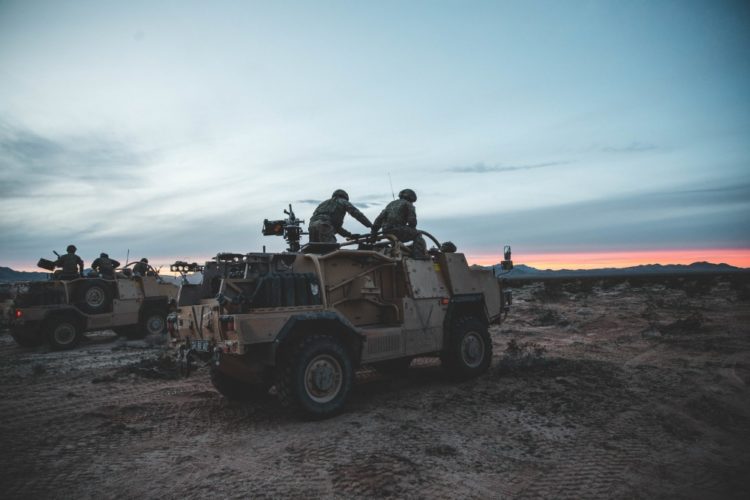The winds of change are blowing fiercely across the geopolitical chessboard, propelling countries to adjust and adapt to remain competitive. Nation-level conflict is once more the focus of Western militaries following decades of counterinsurgency and counterterrorism operations, and special operations forces (SOF) are fighting to remain at the tip of the spear.
According to the BBC’s Newsnight, British special operations forces are lobbying their government for a new role. The Director of Special Forces (SDF) is said to have drafted a concept paper that would overhaul Britain’s SOF. The proposal envisions a force more aligned toward intelligence gathering, influence operations, and hybrid warfare rather than raids and counterterrorism.
Currently, the United Kingdom Special Forces (UKSF) are comprised of the Special Air Service (SAS), Special Boat Service (SBS), Special Reconnaissance Regiment (SRR), and Special Forces Support Group (SFSG). Decades of fighting against terrorist organizations, such as the Islamic State and al-Qaeda, and insurgents have molded the UKSF into a terrifyingly lethal direct action (DA) force. Although DA operations have their merits, in a nation-level conflict, skillsets such as special reconnaissance and unconventional warfare might be more useful to commanders.
Under this new concept, British commandos could find themselves deployed with an increased frequency to the eastern fringes of Europe, Scandinavia, and the Baltic States. The SRR, more specifically, would be at the forefront of conducting intelligence gathering, receiving a significant manpower and budgetary boost. The SAS and SBS, on the other hand, would form regional task forces that would focus more on DA operations in case of a conflict, but also support intelligence gathering. The fact that the current chief of the British Army, Sir Mark Carleton-Smith, is a former SAS officer who commanded the regiment and also served as a DSF suggests that the UKSF would receive broad support for their proposal.
The desire for an operational and strategic shift has been known since the fight against the Islamic State began to wind down. British commandos were among the most active in the operations against ISIS—and they suffered a number of casualties during that conflict.
The UKSF desire for a strategic shift mirrors that of their American brethren. The U.S. Special Operations Command (USSOCOM) and its subordinate commands—the Naval Special Warfare Command (NSWC), Marine Special Operations Command (MARSOC), Army Special Operations Command (USASOC), and Air Force Special Operations Command (AFSOC)—have been vying for a new role after the defeat of ISIS and the interminable nature of the Afghanistan conflict. Chasing down terrorist groups in Africa has its merits, but such operations don’t require a large footprint. Consequently, to justify their humongous budgets, America’s commandos have been adjusting their skill sets to conventional wars once again. More specifically, they are preparing for a potential conflict with Russia or China.
The British Ministry of Defence (MoD) declined a request to comment, following its usual policy with respect to SOF matters.
Already have an account? Sign In
Two ways to continue to read this article.
Subscribe
$1.99
every 4 weeks
- Unlimited access to all articles
- Support independent journalism
- Ad-free reading experience
Subscribe Now
Recurring Monthly. Cancel Anytime.
The winds of change are blowing fiercely across the geopolitical chessboard, propelling countries to adjust and adapt to remain competitive. Nation-level conflict is once more the focus of Western militaries following decades of counterinsurgency and counterterrorism operations, and special operations forces (SOF) are fighting to remain at the tip of the spear.
According to the BBC’s Newsnight, British special operations forces are lobbying their government for a new role. The Director of Special Forces (SDF) is said to have drafted a concept paper that would overhaul Britain’s SOF. The proposal envisions a force more aligned toward intelligence gathering, influence operations, and hybrid warfare rather than raids and counterterrorism.
Currently, the United Kingdom Special Forces (UKSF) are comprised of the Special Air Service (SAS), Special Boat Service (SBS), Special Reconnaissance Regiment (SRR), and Special Forces Support Group (SFSG). Decades of fighting against terrorist organizations, such as the Islamic State and al-Qaeda, and insurgents have molded the UKSF into a terrifyingly lethal direct action (DA) force. Although DA operations have their merits, in a nation-level conflict, skillsets such as special reconnaissance and unconventional warfare might be more useful to commanders.
Under this new concept, British commandos could find themselves deployed with an increased frequency to the eastern fringes of Europe, Scandinavia, and the Baltic States. The SRR, more specifically, would be at the forefront of conducting intelligence gathering, receiving a significant manpower and budgetary boost. The SAS and SBS, on the other hand, would form regional task forces that would focus more on DA operations in case of a conflict, but also support intelligence gathering. The fact that the current chief of the British Army, Sir Mark Carleton-Smith, is a former SAS officer who commanded the regiment and also served as a DSF suggests that the UKSF would receive broad support for their proposal.
The desire for an operational and strategic shift has been known since the fight against the Islamic State began to wind down. British commandos were among the most active in the operations against ISIS—and they suffered a number of casualties during that conflict.
The UKSF desire for a strategic shift mirrors that of their American brethren. The U.S. Special Operations Command (USSOCOM) and its subordinate commands—the Naval Special Warfare Command (NSWC), Marine Special Operations Command (MARSOC), Army Special Operations Command (USASOC), and Air Force Special Operations Command (AFSOC)—have been vying for a new role after the defeat of ISIS and the interminable nature of the Afghanistan conflict. Chasing down terrorist groups in Africa has its merits, but such operations don’t require a large footprint. Consequently, to justify their humongous budgets, America’s commandos have been adjusting their skill sets to conventional wars once again. More specifically, they are preparing for a potential conflict with Russia or China.
The British Ministry of Defence (MoD) declined a request to comment, following its usual policy with respect to SOF matters.










COMMENTS